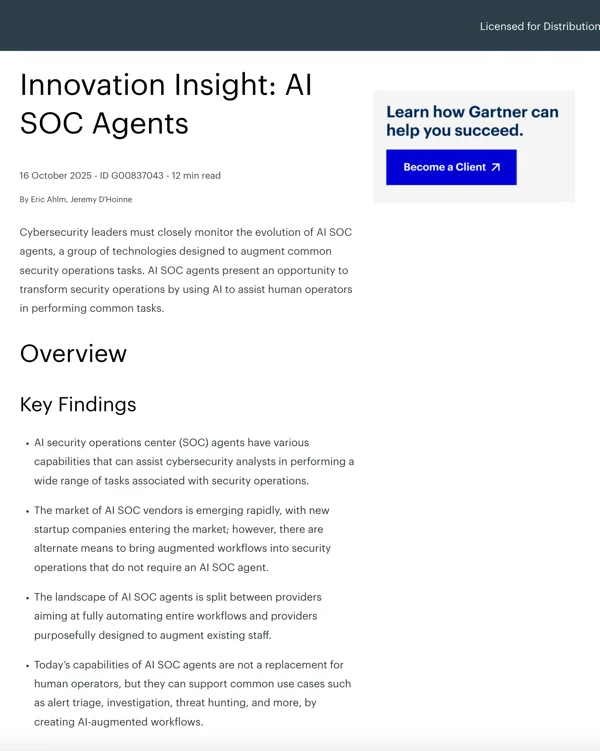
-min.webp)
The modern Security Operations Center (SOC) is under siege, not just from external threats, but from within. Soaring alert volumes, escalating analyst burnout, and an acute shortage of skilled professionals have stretched many SOCs to their breaking point. Even the most advanced automation tools often fail to fully relieve the pressure. This growing gap is driving the emergence of AI SOC Agents, a promising shift that is redefining how security operations are conducted. Gartner recently released the Hype Cycle in Security Operations, 2025 where AI SOC Agents debuted as one of only two Innovation Triggers.
At their core, AI SOC Agents are artificial intelligence-driven systems designed to support a wide range of tasks traditionally handled by human analysts. Unlike basic rule-based automation or static SOAR playbooks, these agents leverage Agentic AI, a more advanced paradigm capable of dynamic planning, adaptive execution, and contextual reasoning. Instead of following pre-defined steps like SOAR tools, AI SOC Agents are adaptive, triaging, investigating, and responding to alerts like a seasoned human SOC analyst.
{{ebook-cta}}
AI SOC agents significantly elevate SOC performance in the following ways:
While the technology is still maturing, AI SOC agents represent more than a productivity boost. Their true value lies in workforce augmentation, freeing security teams from repetitive, low-value tasks and empowering them to focus on strategic initiatives like threat hunting or detection engineering.
For overwhelmed SOCs, this can mean:
Moreover, AI agents create a more fulfilling analyst experience. With menial work delegated to machines, analysts can concentrate on threat hunting, incident strategy, and deeper analysis (areas where human insight is irreplaceable).
Integrating AI SOC agents into security operations workflows demands an operational shift. The classic tiered SOC model (Level 1 triage, Level 2 investigation, etc.) begins to blur. Instead, you get skill-based collaboration, where human analysts function as supervisors, strategists, and quality controllers, partnering with AI agents to scale security outcomes.
For AI agents to be trusted, their reasoning must be transparent. SOCs must ensure that agents can articulate the “why” behind their conclusions, allowing human operators to validate decisions and maintain accountability.
Take a look at the “Glass Box” Prophet AI offers!
Despite their appeal, AI SOC agents come with caveats. The market is still evolving, and real-world efficacy varies significantly between solutions. Leaders should remain vigilant about:
If you're considering deploying AI SOC agents, a strategic and incremental approach is essential. Here’s how to begin:
AI SOC agents are a strategic force multiplier for the modern SOC. By blending dynamic automation with contextual intelligence, these agents have the potential to dramatically reshape security operations: scaling expertise, improving detection, and transforming analyst workflows.
How AI SOC Agents are adopted will be dependent on how organizations think through the value proposition for this new technology. Some might view it simply as a human replacement. However, as the field evolves, successful SOCs will be those that thoughtfully pair human ingenuity with machine efficiency, creating a cyber defense capability that’s faster and smarter.
The question isn’t if AI will transform the SOC, but how you'll lead that transformation. Try Prophet AI today!
An AI SOC Agent is an artificial intelligence system designed to perform tasks typically handled by human analysts in a Security Operations Center (SOC). These agents use advanced AI techniques—like dynamic planning and contextual reasoning—to triage alerts, investigate incidents, and provide actionable recommendations autonomously.
AI SOC Agents work by ingesting telemetry from tools like SIEMs, EDRs, identity providers, and cloud platforms to investigate alerts in real time. They dynamically ask investigative questions, correlate findings, and explain their reasoning—just like a human analyst would.
AI SOC Agents help SOC teams reduce alert fatigue, suppress false positives, and accelerate investigations. They offload repetitive tasks, freeing analysts to focus on threat hunting, detection engineering, and other high-value work.
The benefits of AI SOC Agents include faster triage, reduced burnout, improved onboarding for junior analysts, and more consistent investigations. Organizations can do more with fewer resources while improving their SOC’s responsiveness and effectiveness.
AI SOC Agents shift the traditional tiered SOC structure toward a more collaborative, skill-based model. Analysts supervise and validate the work of AI agents, leading to faster workflows and better scalability across investigations.
AI SOC Agents require high-quality, integrated data sources to function effectively. They also need human oversight for complex or novel threats and may involve pricing models that vary by alert or investigation volume.
To adopt AI SOC Agents, begin by identifying pain points like triage bottlenecks or alert noise. Then, evaluate tools based on autonomy, integrations, and transparency. Run a proof-of-value with clear success metrics like investigation speed or analyst workload reduction.
AI SOC Agents improve SOC metrics by reducing mean time to investigate and respond (MTTI / MTTR), shorten dwell time, and cut down the volume of low-priority alerts that reach analysts. These improvements lead to more efficient operations and higher-quality incident response.
Get Gartner's guidance on evaluating and adopting AI SOC agents

